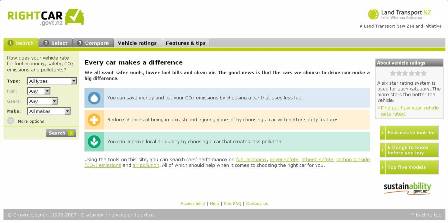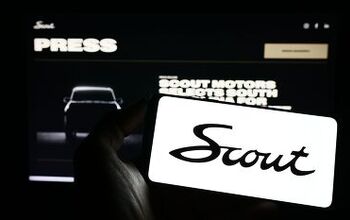NZ Gov's Visible Hand on Automotive Free Market
Let's say you're an American car buyer looking for the cleanest, safest and most fuel efficient vehicle money can buy. You can pop on over to www.fueleconomy.gov and research a vehicle's mpg and emissions, complete with side-by-side comparisons. You can then click across to www.safercar.gov and check out your prospective whip's crash worthiness, albeit one vehicle at a time. As of today, frugal, safety-minded, environmentally-conscious New Zealand car buyers have a much easier time of it. A box fresh Kiwi government website– www.rightcar.govt.nz— ranks, sorts and compares 2300 new and used cars according to their relative fuel economy, CO2, pollutants, Driver Safety, Others' Safety or a combination of all five. Yes, but– The Land Transport New Zealand (LTNZ) says it set-up the site to focus on just one of these criteria. Speaking to Stuff.co.nz, LTNZ chief executive Wayne Donnelly said reducing carbon dioxide emissions was his department's primary goal. Anyway, we can't help but wonder if inter-departmental rivalries and commercial "concerns" would prevent the U.S. government from providing the same sort of user-friendly car buying widget– especially one without a cupholder count.
More by Robert Farago


































Comments
Join the conversation
You kidding? You make consumer car info THAT easy to analyze, and no one with an Internet connection would EVER buy a Detroit 2.8 car. I don't think the Michigan congressional delegation would ever let it happen!
That's quite well done!
So by their definition, the "right car" for you, and everyone else, is the one with the lowest CO2 emissions. That is, even if you ask it for the safest car, those numbers will be skewed towards the ones with the lowest CO2 numbers. Wonderful. Look, people. The Earth has been around for 4.5 billion years, by current scientific theory. In that time, it as seen intense volcanic activity, continents traveling across its surface, the rise of the dinosaurs, the fall of the dinosaurs, asteroid impacts, and several ice ages. Entire mountain ranges have been created, destroyed, and recreated. It has bathed in cosmic radiation, unfiltered for at least part of its life. Its magnetic poles have reversed themselves completely (!), and the magnetic field has varied in strength from very strong (around the time of the dinosaurs) to weak (now), to probably almost none at all. And with all that, life continues to thrive on this planet. Plants find a way to grow in new environments. Animals adapt to new conditions. Humans are the most adaptable species the world has ever known, as far as we know. The changes we see in the state of the planet look to us "abnormal", but to this planet they are a very small blip in a very, very long timeline. We haven't been studying these things long enough to really understand what "normal" is. Maybe what we saw during our brief period of study was actually abnormal, if viewed in the greater context of the planet's entire history. In short, relax, people. Humans are capable of great, and terrible, things, but the planet has withstood forces far greater than anything we can exert. I'm not saying that dumping stuff in the water is a good idea, or that smog is a desirable condition, simply from a quality-of-life standpoint. That said, this constant harping on CO2 is getting a bit old. Douglas Adams once said that interstellar distances just don't fit into the human mind. Neither does the cosmic time scale. And I'll thank the government (any government) to stay out of my car-buying decisions. Robert, consider the can of worms opened. If you'll excuse me, I have to go put on my fireproof suit.
pfingst: I agree. While I believe that we are morally obligated to be good stewards of our planet, I do not think that the CO2 debate holds much water.